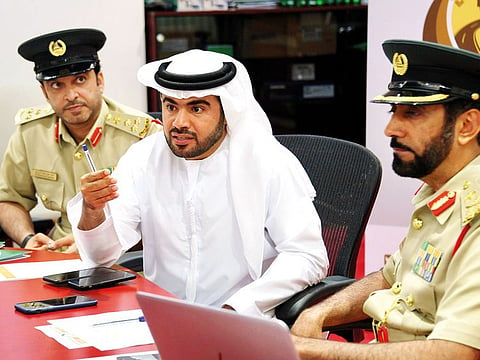41 per cent decrease in road deaths during Ramadan in UAE
30 people killed during last Ramadan compared to 51 killed in Ramadan 2017

Dubai: Road deaths during Ramadan fell 41 per cent last year compared to 2017, an official said on Monday.
Major General Mohammad Saif Al Zafein, Assistant Commander-in-Chief for Operations at Dubai Police and the Director of the Federal Traffic Council, was speaking during the launch of the ‘Accident Free Ramadan’ campaign at the Dubai Officer’s Club in Al Jaddaf on Monday.
“About 30 people were killed in 226 traffic accidents last year during Ramadan, compared to 51 killed in 456 traffic accidents in 2017,” he said.
He added that lowering the speed limit to 110-km/h along Shaikh Mohammad Bin Zayed and Emirates Road within Dubai had helped reduce accidents on that stretch by 13 per cent, but he said that indicators predict a rise in this ratio by the end of the year prompting the need for more road safety awareness.
Al Zafein said accidents were mainly caused by speeding, sudden lane deviation, lack of attention by using phones, not using a seatbelt or leaving enough room between you and the car in front, and pedestrians crossing from non-designated areas. He said that the most common violators were in the 18-24 age bracket.
“One person has already been killed in a traffic accident in Dubai today, on first day of Ramadan,” he said, but he added that the percentage of road deaths in the UAE per 100,000 people is just 3.83 per cent, which is better than Finland, Spain, France and Australia. The UAE still aims to reduce that percentage to one or two per cent through better awareness.
Traffic jams usually occur during Ramadan, Al Zafein said, as people rush home for iftar, but he added police have put a comprehensive road safety plan in place besides deploying extra patrols.
“Many drivers speed to catch iftar time or return home after work. Speeding and not paying attention to the road is dangerous behaviour,” he warned.
This campaign will include the distribution of flyers with iftar meals to drivers before sunset.
Meanwhile, Ahmad Al Hajiri, National Ambulance CEO, said that accidents during Ramadan usually happened between 2am and 3am.
“Last year, we noticed a 271 per cent increase in accidents before Suhoor time compared to the same period of time in other months,” he said. “Drivers should have tolerance this holy month. Drivers shouldn’t drive when they feel tired and they should wear seatbelts all the time,” he added.
The National Ambulance service will also publish short clips to educate people on first aid in the event of a traffic accident.
Road safety tips for Ramadan
■ Watch out for other road users
■ Be ready for unexpected situations
■ Plan your schedule properly and leave early to avoid the need to rush and speed
■ Always wear your seat belt
■ Don’t use mobile phones or lose track of the road
Sign up for the Daily Briefing
Get the latest news and updates straight to your inbox


